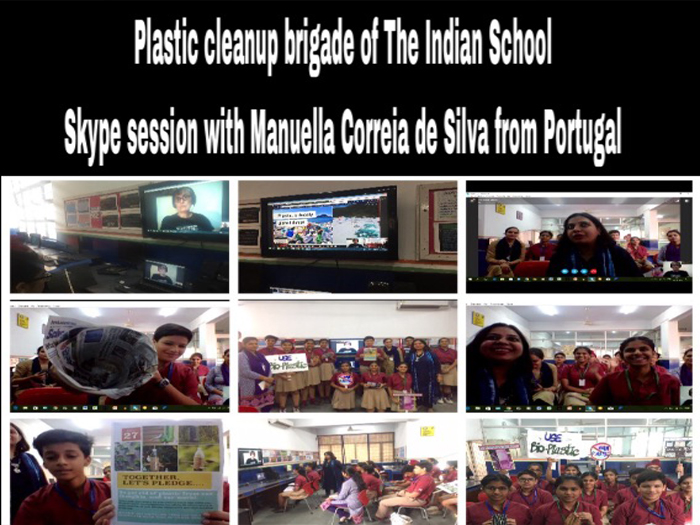Video conference on Environment with a Portuguese teacher.
Class IX students were given the unique opportunity of an interactive video session with Ms. Manuela Correia da Silva of Portugal on 27 October17. It was an unforgettable learning experience for the students and Ms Correia was also overwhelmed by the enthusiasm shown by the children to interact about innovative ideas for the ecology.
Ms. Correia is a school teacher in a small town named Espinho, in Portugal. Besides teaching, she runs a campaign to make people aware of the harmful effects of plastic and to discourage its use. Her students and she work together, using various methods and platforms to spread the word about the horrendous consequences of using plastic. Through interactive games, presentations, videos, posters, pamphlets, and others, she enlightens her listeners with facts that really horrify the soul!
[gallery link="file" order="DESC"]
The session started with a presentation by Ms. Correia, which showed the students an image of Earth covered by plastic. A small island in the Pacific Ocean, which is a UNESCO World Heritage Site, due to its biodiversity, flora and fauna, is now covered with plastic travelling on ocean currents from continents far away. The fact, that astonished the audience is that despite such gross adversity, the island is inhabited!
Through the presentation, Ms. Correia explained the consequences of dumping plastic. She started with its history, and then explained how plastic has become a curse. It never degrades, but simply, gets smaller, eventually converting to micro plastic which is easily ingested by small fish. This results in biological magnification, which greatly jeopardises aquatic life.
Ms. Correia disclosed facts which were very alarming. If the current situation ( as she described) is allowed to prevail, by 2050, we will have more plastic waste than fish in our water bodies. In fact already, labs are finding traces of plastic in tap water.
We heard about the initiatives undertaken by Ms. Correia and her students. She also asked our students to do the same and the latter offered some ideas they had thought about to replace plastic per se. They said we can wash dishes with wool and the husk of coconut, for mild and harsh scrubbing, respectively. Newspaper can replace polythene bags for garbage, straps of wool can easily replace plastic slipper straps. Plastic bags should be replaced with cloth bags or paper bags. The 5Rs Reduce, Reuse, Recycle, Refuse, and Replenish should be actively implemented in the case of plastic.
Plastic could be shredded to produce comfortable jeans, and can also be recycled to create non-poisonous plasticware. Apparently there are trials being done for even creating jewellery similarly.
Our students showed posters made on the subject which Ms. Correia appreciated. The students also informed her about our Schools initiative to abandon plastic under the Citizenship Programme. They explained how they use street plays to spread the message. She also suggested we hold similar sessions with other groups doing work on the area of saving the environment such as Hannah4Change and others.
Ms. Correia said she was very was happy to have interacted with students who demonstrate a determined-to-preserve-environment attitude.













